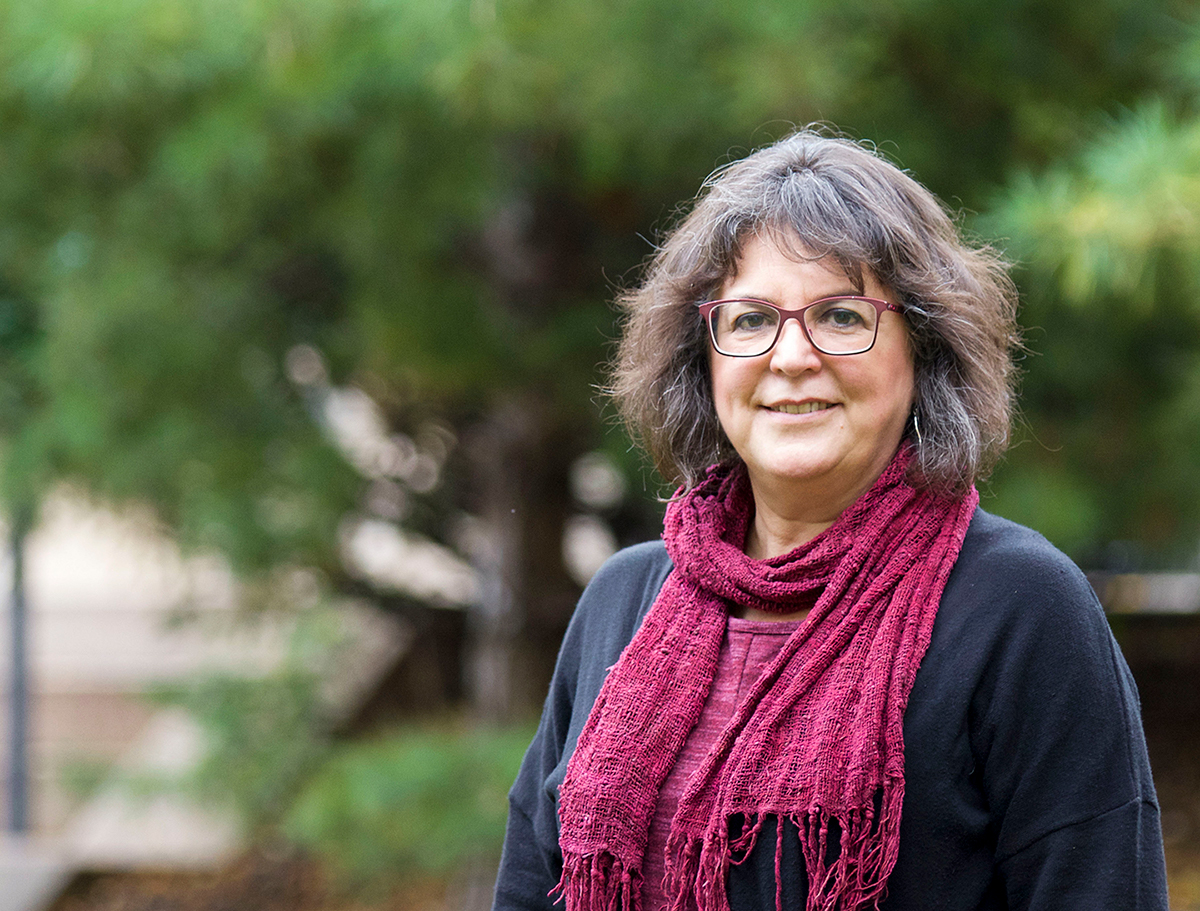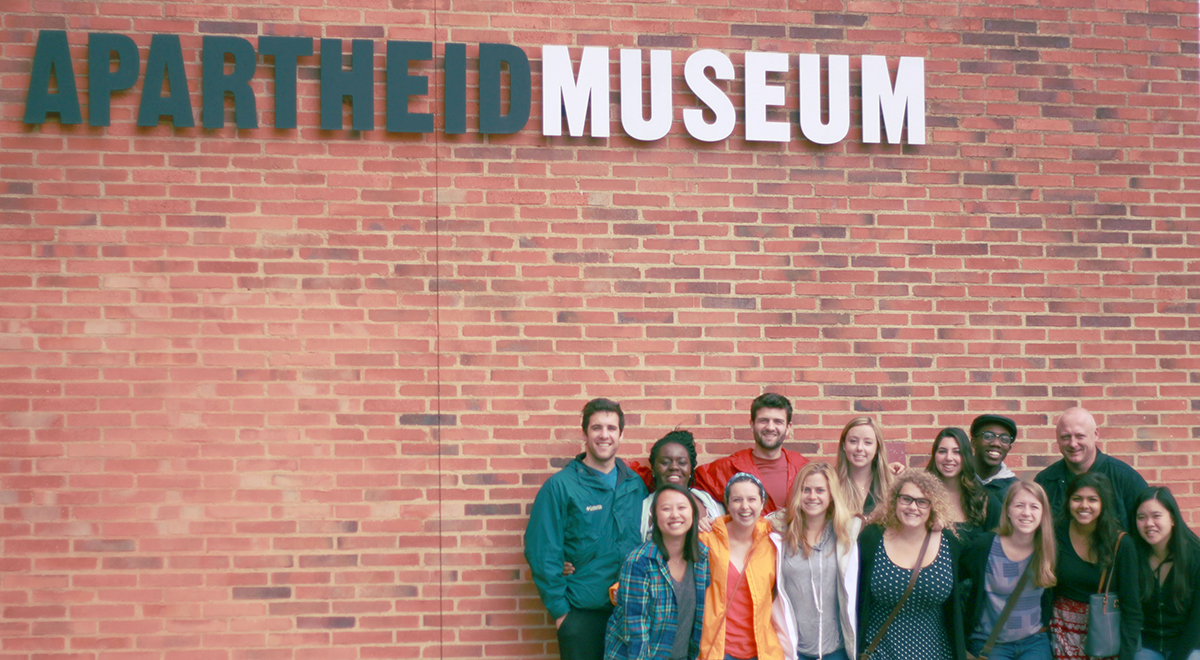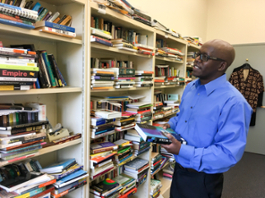Partnership Spotlight: From the flatlands of Illinois to the mountain valleys of South Africa
Partnership Spotlight: From the flatlands of Illinois to the mountain valleys of South Africa

Dévora Grynspan, Vice President for International Relations, with Northwestern students on the Public Health in South Africa program in 2005.

Jacob Du Plessis, Public Health and Development in South Africa Program Director and Stellenbosch University Sociology lecturer, with a group of Northwestern students in 2015.

Evan Mwangi, Associate Professor of English, Comparative Literature, and African Studies at Northwestern
Northwestern University's relationship with Stellenbosch University is a flagship example of strategic collaborations and partnership building
It may be cliché, but it’s true: The world is a small place.
On a sunny afternoon in 2004, thousands of miles away from Northwestern’s campus, Dévora Grynspan entered the office of the political science chair at Stellenbosch University in South Africa. It was then that Grynspan saw a familiar face–Amanda Gouws, a former PhD student from the University of Illinois at Urbana-Champaign, where Grynspan had taught Latin American politics from 1986 to 1998.
In her role as director of Northwestern’s former Office of International Program Development, Grynspan had traveled to Stellenbosch, a quintessential small college town in the Western Cape, to set up a customized study abroad program for Northwestern undergraduate students. And so, she did—with the help of the graduate student she had taught 20 years prior in Illinois.
“Amanda was the main person at Stellenbosch who helped create our unique program from the beginning, and she is still heavily involved,” says Grynspan, who is now vice president for international relations. “The program wouldn’t be what it is today without all her hard work and input.”
Over the years, this exceptionally successful study abroad program has sent close to 230 students from Northwestern to Stellenbosch for a unique experience in global health—to learn about everything from the public health system and its most pressing challenges to South Africa’s unique historical and political context.
Since that meeting 13 years ago, Grynspan and Gouws, together with program director Jacob Du Plessis and other dedicated faculty and administrators at Northwestern and Stellenbosch, have built a unique, multifaceted partnership, spanning several study abroad programs, various research collaborations among faculty and students, and new curriculum development initiatives.
This past fall, as Gouws completed a residency at Northwestern to finish a book she is working on, the two academics reflected on their journey to bring Northwestern and Stellenbosch together.
UNIQUE STUDY ABROAD OPPORTUNITY FOR NORTHWESTERN STUDENTS IN SOUTH AFRICA
The first group of 16 Northwestern undergraduate students went on the Public Health in South Africa program in spring 2005. As Grynspan and Gouws collaborated through the years, the curriculum shifted and improved. By 2008, a track on diversity and democracy in South Africa was added, and by 2012, both tracks were combined to form one program.
“The aim was to make the students more familiar with the South African context,” says Gouws, now a professor of political science and research chair in gender politics at Stellenbosch University. “At the time we started, South Africa was still struggling to bring the very high levels of AIDS infection down.” Putting a strong emphasis on the health epidemic was important, as was “trying to understand it in its sociopolitical context in an African country,” she adds. “So we decided that we would teach students about South African politics, as well.”
Now called Public Health and Development in South Africa, the quarter-long program offers students in-classroom instruction with preeminent guest lecturers and practitioners, along with site visits to local health clinics, community organizations, museums, and important historical sites.
The highlight of the program is an excursion to South Africa’s oasis of natural wildlife, Kruger National Park. For four days, Northwestern students immerse themselves in pure natural beauty—through early morning walks, late-night drives with park rangers, and lectures from wildlife and safari experts. They then travel to Hamakuya, a rural village in northern South Africa, where students stay with local villagers, learn from traditional communities, and participate in a water insecurity study. The trip, led by noted scientist and Northwestern alumnus David Bunn, culminates in a candlelit dinner on the banks of the Olifants River, with bellows of hippos sounding nearby and twinkling stars as the backdrop.
“By being in a space where one is challenged by silence and where one’s sense of time is so different compared to life in Evanston, many students can observe how a simplified life could be so meaningful to those living in remote rural villages—irrespective of initial impressions of poverty and inequality,” says Jacob Du Plessis, a lecturer in sociology at Stellenbosch who has served as program director for over a decade.
“A shift in thinking occurs through embodied experiences and engaging others within their own space and on their terms. What might seem strange often becomes familiar, while the familiar might feel strange or even wrong for some students who return home at the end of the program,” he says.
For many Northwestern students who have studied at Stellenbosch University since the program’s inception in 2005, it was more than just a study trip abroad. Northwestern alumnus Kalindi Shah, who participated in the program in 2012, has had time to reflect on her transformative time abroad. “With passionate, world-class faculty leading us, we dove headfirst into the rich, diverse experiences Stellenbosch had to offer—whether it was learning about Julius Malema during lecture or developing a sexual health curriculum for an NGO,” she remembers. “Altogether, it was a beautifully life-changing experience.”
Du Plessis echoes Shah’s sentiment on her experience abroad. “The program presents the perfect balance between play and work and would be one of the most memorable experiences a student could have,” he says.
MEDICAL, ENGINEERING, AND EXCHANGE STUDY ABROAD OPPORTUNITIES ADDED
Building on the success of the undergraduate public health program, Grynspan has since collaborated with Northwestern faculty and administrators across several disciplines to establish additional opportunities in South Africa.
In 2008, the Feinberg School of Medicine developed a medical student exchange with Stellenbosch University Medical School and Tygerberg Hospital, Stellenbosch’s affiliated teaching hospital. By June 2018, 98 fourth-year medical students will have completed four-to-six-week-long rotations in South Africa.
In 2016, the two universities added an undergraduate exchange program to provide students from both institutions the opportunity for a more immersive academic and cultural experience. So far, two Stellenbosch students have spent one quarter each at Northwestern, and one Northwestern student has participated in the exchange in South Africa. To make the exchange program accessible to all Stellenbosch students, Northwestern covers the cost of room and board and health insurance.
This year, another undergraduate study abroad program was added to the partnership: Global Healthcare Technologies. “The program allows engineering students to gain a hands-on, immersive experience by working directly with South Africans to design technologies to improve health outcomes,” says Karey Fuhs from the Office of Undergraduate Learning Abroad, who has overseen the program since 2010 and assisted in transitioning the program from the University of Cape Town. “Stellenbosch University is a great partner for this program, given their strong engineering faculty, community and industry connections, international programs infrastructure, and our already existing strong relationship,” she says.
This winter quarter, a total of 16 engineering students are participating in this program, developed jointly by Northwestern Biomedical Engineering Professors Matthew Glucksberg and David Kelso, and colleagues from South Africa.
NEW CONNECTIONS WITH STELLENBOSCH UNIVERSITY
International partnerships provide a multitude of possibilities not just for students, but also for faculty and scholars. One such example is the three-and-a half-year, $1 million Andrew W. Mellon Foundation grant awarded to Northwestern in 2016 to support new inter-university teaching cooperations in conjunction with a $1.5& million grant awarded by the Mellon Foundation to the University of California, Berkeley, to establish—in cooperation with colleagues from a number of universities—the International Consortium of Critical Theory Programs (ICCTP).
“The purpose of the consortium is to internationalize critical theory,” says Evan Mwangi, associate professor of English, comparative literature, and African studies at Northwestern. “It is mainly to change how we do critical theory in the West, because critical theory is usually seen as Western philosophical thought, and we’re trying to change that to include perspectives from the global south—Africa and Latin America.”
With the first year of the ICCTP already underway, Northwestern is currently running several projects as part of the Critical Theory in the Global South Project, involving Stellenbosch and several institutions around the world. One of these projects is the Indian Ocean Epistemologies, led by Mwangi and his colleague Tina Steiner, professor of English at Stellenbosch University. The two are in charge of developing a course on Indian Ocean epistemologies, translating Xhosa travelogues to India into English, and publishing scholarly articles in a special issue of the Eastern African Literary and Cultural Studies journal.For Mwangi, Stellenbosch’s geographic location and expertise in the field makes the university an excellent partner. By being able to spend time in South Africa this past March, Mwangi was able to immerse himself into the South African culture to better understand the Indian Ocean concept in all its facets. “African culture is very oral,” he says. Many ideas and narratives about the Indian Ocean are communicated verbally through storytelling or folklore, without ever getting published. “You have to go and have conversations with the African people and learn from them,” says Mwangi.
Bringing South African fellows and professors to Northwestern as part of the project also allows Northwestern students and researchers to get insights into different perspectives and a deeper understanding of the topic at their home campus. This past year, doctoral student Serah Namulisa Kasembeli from Stellenbosch spent six months at Northwestern as part of the project, using Northwestern’s rich Africana library collection to conduct research on African critical theory. “She is learning a lot from us, as we’re learning from her,” says Mwangi.
This type of reciprocal global relationship building is a continuous central effort of the University. “Increasing this type of exchange on all levels and across disciplines to internationalize the campus, the curriculum, and students and faculty is crucial for a global university of our caliber,” says Grynspan.
“As with most partnerships, we want to encourage faculty to go to South Africa to meet their counterparts and engage in collaborations,” she says. “And we want to bring faculty and scholars here, as well."
A VISITING SCHOLAR AND CHANGE AGENT WITH A WOMEN’S RIGHTS MISSION
Amanda Gouws wears many hats. Along with her role as professor of political science and research chair in gender politics at Stellenbosch University, she is a widely known activist and published academic in women’s rights and representation.
In her most recent research, Gouws analyzes the lack of public protest from the South African women’s movement since the end of apartheid in 1994. In South Africa, gender-based violence has reached a fever pitch. Rates for rape are among the highest in the world, and murders of women by current or former intimate partners are disturbingly common. In this context, Gouws asks a simple question: Why don’t South Africans have large-scale protests? She contrasts her home country with India, a country similarly plagued by violence and abuse against women, but whose protests against gender-based violence make international news. “In South Africa,” says Gouws, “it’s not even front-page news anymore, and you don’t see large-scale organizing by women against violence. Except in 2016, when female students took their protests against rape culture to the streets across South Africa, it has mainly been done on the community level.”
Her position as a visiting scholar at Northwestern provided Gouws with enhanced access to books, journals, and time to focus—away from demands on her home campus—and most importantly, proximity to academics with similar interests but different backgrounds.
“I think one of the great opportunities of being a visiting scholar is to expose your ideas to people who come from a completely different perspective. It allows you to understand the weaknesses and strengths of your arguments, and how context shapes a lot of what we think,” says Gouws.
Gouws views herself as a change agent at the intersection of gender and race—and rightly so. Gouws and a colleague wrote the first sexual harassment policy for Stellenbosch University in 1994 and established a women’s forum examining the conditions of employment for women, where she was the first woman on the appointments committee.
She was also commissioner for the South African Commission for Gender Equality from 2012 to 2014. In 2016, she received a prestigious research scholarship: the South African National Research Foundation Research Chair in Gender Politics at Stellenbosch University—an award that, until recently, had been given to very few women. In 2014, the South African Research Chair Initiative (SARChI) ran a round of applications just for women. The 44 women who were granted chairs are now widely known as the SARChI 44, a powerhouse group of elite female academics. Of this elite group, Gouws is the only woman with a SARChI chair appointment in political science.
The scholarship funds Gouws’ research on women’s activism and movements, as well as her students’ work on female representation in government, political activism, policy affecting women’s reproductive health, and social welfare and poverty.
A DECADE-OLD PARTNERSHIP CONTINUES TO HAVE GREAT IMPACT TODAY
Through Gouws’ relationship with Northwestern, her work’s impact has reached far beyond the borders of South Africa. Weinberg senior Kathleen Clark, who studied abroad in South Africa this past spring and met with Gouws while in Evanston, credits Gouws with her invigorated passion for women’s rights. “While I anticipated I would become a stronger advocate for non-dominant races and ethnicities—and you bet I did—I didn’t anticipate becoming so much more passionate about women’s rights and feminism during my time in South Africa,” she says. “For that, I owe a lot of thanks to Professor Gouws. She is an example of both career and personal excellence, all while fighting tirelessly for other women and yet retaining her infectious sense of humor.”
When Gouws departed Evanston a few weeks ago, Grynspan reflected on their relationship.
“I was very proud to see a product of my classroom in that office,” says Grynspan, reminiscing on the moment she recognized Gouws in her Stellenbosch office in 2004. The life-long collegial friendship has influenced a unique, multifaceted international partnership, as well as the personal and professional development of hundreds of students, faculty, and researchers who travel between the two universities.
